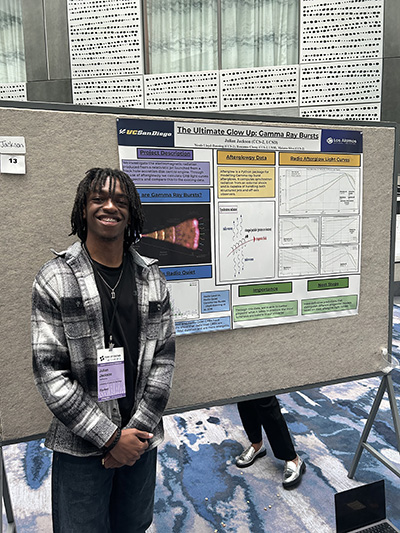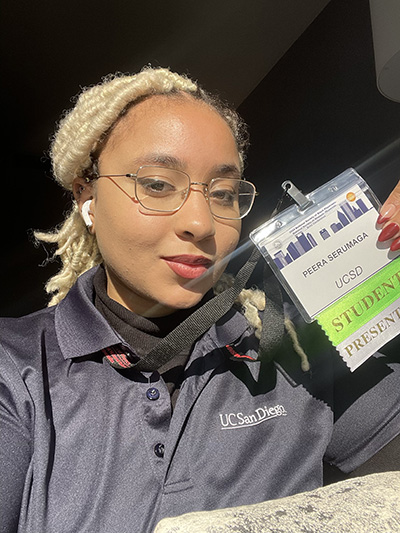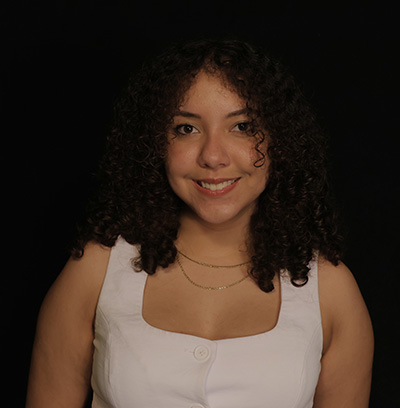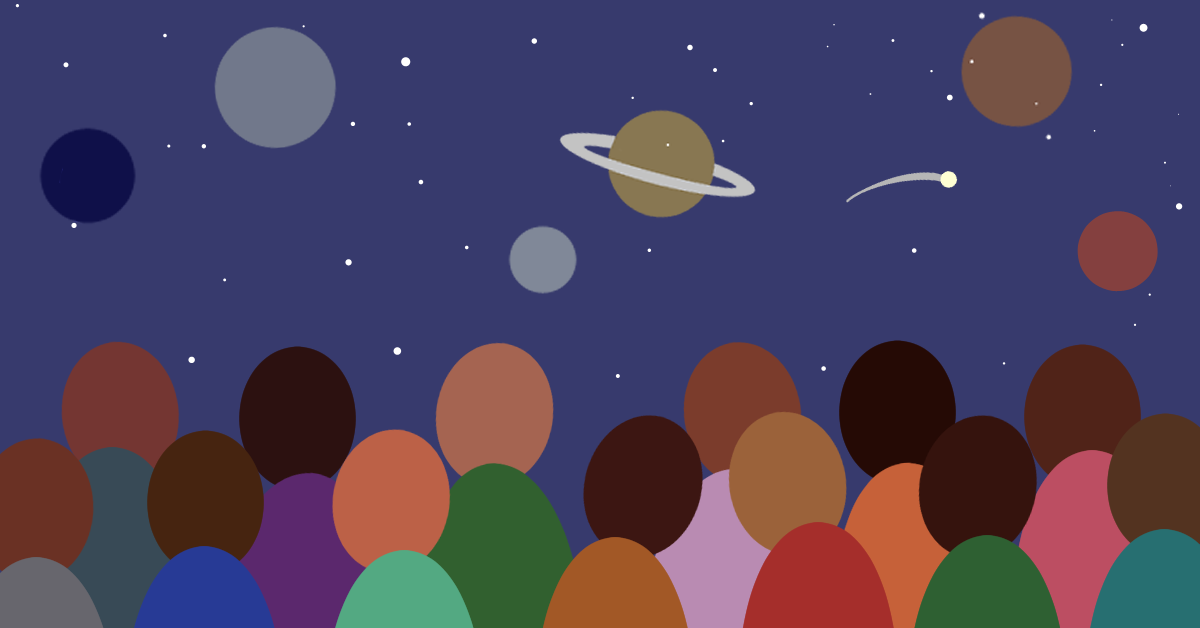Seeing Yourself in the Stars
UC San Diego students attend a conference celebrating Black excellence in physics
Story by:
Published Date
Article Content
The National Society of Black Physicists (NSBP) was founded in 1977 to support the professional development of African American physics researchers and students. Last fall they held a joint conference with the National Society of Hispanic Physicists under the theme of “Merging Nuclei — Creating Stronger Forces.” The conference, held in Houston, Texas, welcomed 1,100 visitors from around the nation, including three from the University of California San Diego. Undergraduates Julian Jackson, Peera Serumaga and Lauren Cadle share their thoughts on the conference, their passion for astronomy and why representation matters.
Q: What drew you to astronomy and astrophysics?

Julian Jackson: When I was little, I would watch NOVA ScienceNOW with Neil deGrasse Tyson, but he couldn’t respond to all the questions I had! When I asked my mom, she said, “Why don’t you find out? Who knows, maybe you’ll become an astrophysicist one day, Juju.”
Lauren Cadle: I chose astrophysics because I have a deep desire to uncover the truths from our universe. When I was fourteen, I asked why non-living cells can form living things, and my biology teacher told me it was a very philosophical question. I went down a google search rabbit hole and miraculously ended up at cosmology!
Q: What has been the biggest obstacle of your academic journey?
Jackson: As a first-generation African American college student, I've faced a number of challenges, but the biggest obstacle has to be myself. With all of the pressures around me, nothing comes close to the amount of pressure I put on myself to succeed academically. While I'm still battling this challenge, I'm learning to love myself more and give myself more grace.

Peera Serumaga: The biggest obstacle I’ve faced is finding a sense of purpose and belonging while confronting my fears of inadequacy. Intersectionality has played a significant role in my physics journey, as I’ve often felt the weight of my identities in higher education. Navigating both physical and mental health challenges has been suffocating at times. However, a strong network of friends, family and mentors, along with taking time to appreciate each accomplishment and opportunity, has allowed me to persevere despite the challenges.
Q: What were some of the benefits of attending this conference?
Jackson: The conference was truly amazing and a sight to see! One thing I learned is that the path to becoming an astrophysicist is not linear. I was able to hear so many amazing stories from professors who failed classes, had been rejected and wanted to give up, to having some of the most influential papers in our field! I'm truly grateful for the experience.
Serumaga: My friend introduced me to a theoretical astrophysicist whose background and identities closely parallel my own. We connected, and he expressed interest in mentoring me throughout school and my career. This experience was truly inspiring‚ I felt seen and reassured knowing that there are physicists out there just like me. It gave me the confidence to believe that if they could do it, I could too.
Q: What is the importance of connecting with peers and seeing successful Black scientists?
Serumaga: A shared sense of community is incredibly important, especially when navigating new situations and challenges. It can be isolating to be in such a demanding field with no sense of community. And it’s inspiring to see other people with similar identities as me have amazing careers. It reinforces my belief that I can succeed too!

Cadle: I think this is a critically important issue, both in STEM classes and in the broader sphere of higher education. I am often the only Black person in astrophysics classes and other academic settings — that's a thought I take into every class. Outside of classes, I have friends who I love and trust. Sharing in our culture as Black Americans, our similar experiences in and out of the classroom, and shared background does wonders for our mental health as we navigate the challenges of being "the firsts" of our families and friends.
Q: What are the biggest challenges underrepresented groups in science face?
Serumaga: The biggest challenge I’ve experienced in astrophysics and STEM fields is belonging. Feeling alienated can impact your sense of community, security, safety and connection. It can lead to imposter syndrome, which can affect your mental health and grades. There’s so much to navigate, and everyone’s experience is different, but that lack of belonging is something many of us face.
Cadle: For underrepresented groups, often the hardest challenge is the lack of numbers. Nationwide, across many universities, there may be X number of underrepresented minorities in astrophysics or another discipline, but on an individual university level, those numbers may be small. Advocating for change and representation for underrepresented groups when there are not enough people in these groups is an uphill battle that requires strength to be one of a small number of people to fight for an issue you're passionate about.
Q: Why did you choose UC San Diego?
Jackson: I chose UC San Diego because of its great research throughout the years, especially in physics. It was truly the whole package academically and if I had to go back, I'd choose UC San Diego again and again.
Serumaga: UC San Diego is a top university for my program, and I was lucky enough to be a part of the incoming class the year before the Department of Astronomy and Astrophysics was even launched. The campus is amazing and the weather is beautiful too!
Cadle: I chose UC San Diego because I knew this university was at the forefront of physics and astronomy research. Reading about the professors and their research would give me goosebumps, and I am honored to be a part of advancing physics research at such a young age. I chose UC San Diego because I wanted to join the tide of changemakers and innovators.
Share This:
You May Also Like
Stay in the Know
Keep up with all the latest from UC San Diego. Subscribe to the newsletter today.




